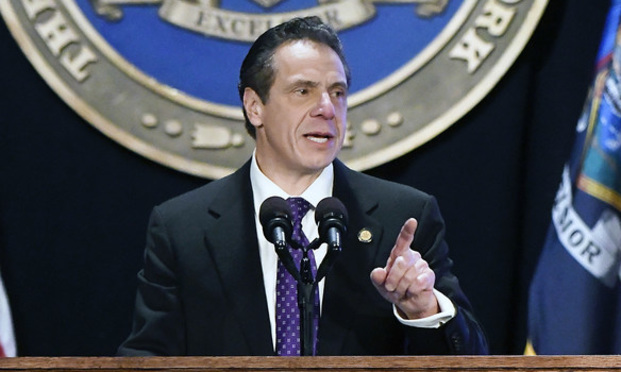Governor's Attack on the Judiciary Is a Danger to Our Democracy
The governor as chief executive has no power or authority over the day to day operation of the courts. The three branches of our state's government are co-equal.
January 26, 2018 at 03:17 PM
4 minute read

The 2018-2019 New York State fiscal year budget negotiations are in full swing in Albany. Governor Cuomo delivered his State of the State address to the Legislature, and a proposed budget has been put forth for us to decipher and scrutinize. During the governor's address, he made attention grabbing statements about, and a proposal regarding, the New York State judiciary. Under the governor's proposal, state-paid judges or justices assigned to trial courts of the state's Unified Court System would have to certify each month, in a statement, that they “performed judicial duties at an assigned court location for the full daily period of at least eight hours.” The state comptroller would also conduct periodic reviews and audit the certifications to “ensure that the state is responsibly authorizing state dollars for judicial salaries and the operation of state trial courts,“ according to legislation proposed by the governor's office. Comptroller Tom DiNapoli's office would then “evaluate the accuracy of the judicial certification and the effectiveness of the certification system as a whole,” according to the proposed legislation.
This is an imperious overreach by the governor, and an all out attack upon our state's Judicial branch. The New York State Constitution mirrors our federal constitution in relation to the principle of “separation of powers.” The intent is to prevent the concentration of power in one branch, and to provide for checks and balances. The governor as chief executive has no power or authority over the day to day operation of the courts. The three branches of our state's government are co-equal. The Office of Court Administration (OCA) is the administrative body sanctioned by the chief judge of our state's highest court to manage and oversee the day to day administration of the courts. Supervising judges have clerks come to the courtrooms in the morning and afternoon sessions daily to monitor courtroom activity. Daily activity logs are created and sent to OCA. The chief judge and her designees monitor the statistics of every judge closely.
Simply put, a governor should not interfere, impress his will or commandeer another co-equal branch. As our judges do their best to steer clear of the political world, you will not hear them complain, protest or condemn this overreach. It is however, incumbent upon members of the legislature to speak up, defend and protect the judicial branch against this overreach. This is the nature of the checks and balances that our State Constitution provides for.
During my career, I have had the privilege of working as a research assistant, a court attorney, and as a law clerk to a justice of the Supreme Court, and other judges within the Unified Court System. I can attest to the scholarship, diligence, professionalism and compassion of our judges in Staten Island and Brooklyn. I have no doubt that the same is true throughout the rest of the state. These men and women, who could make far more money in the private sector, devote themselves to public service because they believe in the law, and the concepts of justice and fairness. On a tight shoestring budget, the men and women of our judiciary undertake some of the most essential and important roles in our society.
The judges in our lower courts, criminal, civil, and housing, routinely put in much longer than eight hour days. Our criminal court judges work nights and weekends 365 days a year. Our judges start work early, and they take work home with them. They are constantly reading, learning, and even teaching, in our law schools, colleges and universities. These are not ordinary civil servants and they are not ordinary people. They are learned professionals and academics worthy of our respect, honor and admiration. They rarely get praise and we only hear about them in the press, however rarely, when something goes terribly wrong. The governor's proposal for the judiciary to 'punch a clock' is a disparaging and dangerous notion for our democracy.
Washington said that the administration of justice is the firmest pillar of government and that the courts are essential to the stability of our political system. Let us stand together upon that pillar, and and send a message to the governor that separation of powers is important, and that the checks and balances provided for in our State Constitution are still as strong and effective as they were when crafted over 240 years ago.
Ron Castorina Jr. is a New York state assemblyman.
This content has been archived. It is available through our partners, LexisNexis® and Bloomberg Law.
To view this content, please continue to their sites.
Not a Lexis Subscriber?
Subscribe Now
Not a Bloomberg Law Subscriber?
Subscribe Now
NOT FOR REPRINT
© 2025 ALM Global, LLC, All Rights Reserved. Request academic re-use from www.copyright.com. All other uses, submit a request to [email protected]. For more information visit Asset & Logo Licensing.
You Might Like
View All
A Biblical Reconciliation Between Judaism and Islam: A Lesson for Everyone, Everywhere
6 minute readTrending Stories
- 1Conversation Catalyst: Transforming Professional Advancement Through Strategic Dialogue
- 2Trump Taps McKinsey CLO Pierre Gentin for Commerce Department GC
- 3Critical Mass With Law.com's Amanda Bronstad: 700+ Residents Near Ohio Derailment File New Suit, Is the FAA to Blame For Last Month's Air Disasters?
- 4Law Journal Column on Marital Residence Sales in Pending Divorces Puts 'Misplaced' Reliance on Two Cases
- 5A Message to the Community: Meeting the Moment in 2025
Who Got The Work
J. Brugh Lower of Gibbons has entered an appearance for industrial equipment supplier Devco Corporation in a pending trademark infringement lawsuit. The suit, accusing the defendant of selling knock-off Graco products, was filed Dec. 18 in New Jersey District Court by Rivkin Radler on behalf of Graco Inc. and Graco Minnesota. The case, assigned to U.S. District Judge Zahid N. Quraishi, is 3:24-cv-11294, Graco Inc. et al v. Devco Corporation.
Who Got The Work
Rebecca Maller-Stein and Kent A. Yalowitz of Arnold & Porter Kaye Scholer have entered their appearances for Hanaco Venture Capital and its executives, Lior Prosor and David Frankel, in a pending securities lawsuit. The action, filed on Dec. 24 in New York Southern District Court by Zell, Aron & Co. on behalf of Goldeneye Advisors, accuses the defendants of negligently and fraudulently managing the plaintiff's $1 million investment. The case, assigned to U.S. District Judge Vernon S. Broderick, is 1:24-cv-09918, Goldeneye Advisors, LLC v. Hanaco Venture Capital, Ltd. et al.
Who Got The Work
Attorneys from A&O Shearman has stepped in as defense counsel for Toronto-Dominion Bank and other defendants in a pending securities class action. The suit, filed Dec. 11 in New York Southern District Court by Bleichmar Fonti & Auld, accuses the defendants of concealing the bank's 'pervasive' deficiencies in regards to its compliance with the Bank Secrecy Act and the quality of its anti-money laundering controls. The case, assigned to U.S. District Judge Arun Subramanian, is 1:24-cv-09445, Gonzalez v. The Toronto-Dominion Bank et al.
Who Got The Work
Crown Castle International, a Pennsylvania company providing shared communications infrastructure, has turned to Luke D. Wolf of Gordon Rees Scully Mansukhani to fend off a pending breach-of-contract lawsuit. The court action, filed Nov. 25 in Michigan Eastern District Court by Hooper Hathaway PC on behalf of The Town Residences LLC, accuses Crown Castle of failing to transfer approximately $30,000 in utility payments from T-Mobile in breach of a roof-top lease and assignment agreement. The case, assigned to U.S. District Judge Susan K. Declercq, is 2:24-cv-13131, The Town Residences LLC v. T-Mobile US, Inc. et al.
Who Got The Work
Wilfred P. Coronato and Daniel M. Schwartz of McCarter & English have stepped in as defense counsel to Electrolux Home Products Inc. in a pending product liability lawsuit. The court action, filed Nov. 26 in New York Eastern District Court by Poulos Lopiccolo PC and Nagel Rice LLP on behalf of David Stern, alleges that the defendant's refrigerators’ drawers and shelving repeatedly break and fall apart within months after purchase. The case, assigned to U.S. District Judge Joan M. Azrack, is 2:24-cv-08204, Stern v. Electrolux Home Products, Inc.
Featured Firms
Law Offices of Gary Martin Hays & Associates, P.C.
(470) 294-1674
Law Offices of Mark E. Salomone
(857) 444-6468
Smith & Hassler
(713) 739-1250









